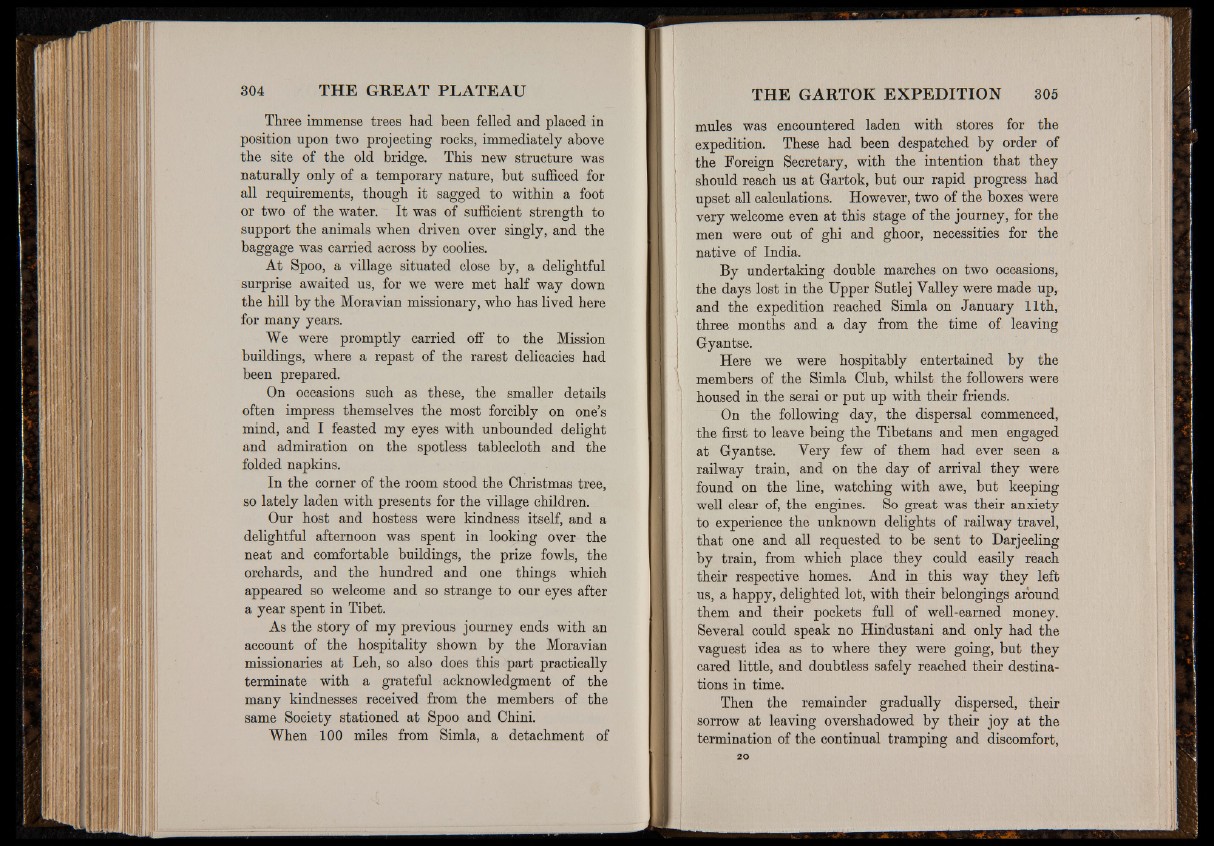
Three immense trees had been felled and placed in
position upon two projecting rocks, immediately above
the site of the old bridge. This new structure was
naturally only of a temporary nature, but sufficed for
all requirements, though it sagged to within a foot
or two of the water. It was of sufficient strength to
support the animals when driven over singly, and the
baggage was carried across by coolies.
At Spoo, a village situated close by, a delightful
surprise awaited us, for we were met half way down
the hill by the Moravian missionary, who has lived here
for many years.
We were promptly carried off to the Mission
buildings, where a repast of the rarest delicacies had
been prepared.
On occasions such as these, the smaller details
often impress themselves the most forcibly on one’s
mind, and I feasted my eyes with unbounded delight
and admiration on the spotless tablecloth and the
folded napkins.
In the corner of the room stood the Christmas tree,
so lately laden with presents for the village children.
Our host and hostess were kindness itself, and a
delightful afternoon was spent in looking over the
neat and comfortable buildings, the prize fowls, the
orchards, and the hundred and one things which
appeared so welcome and so strange to our eyes after
a year spent in Tibet.
As the story of my previous journey ends with an
account of the hospitality shown by the Moravian
missionaries at Leh, so also does this part practically
terminate with a grateful acknowledgment of the
many kindnesses received from the members of the
same Society stationed at Spoo and Chini.
When 100 miles from Simla, a detachment of
mules was encountered laden with stores for the
expedition. These had been despatched by order of
the Foreign Secretary, with the intention that they
should reach us at Gartok, but our rapid progress had
upset all calculations. However, two of the boxes were
I very welcome even at this stage of the journey, for the
men were out of ghi and ghoor, necessities for the
native of India.
By undertaking double marches on two occasions,
the days lost in the Upper Sutlej Valley were made up,
j and the expedition reached Simla on January 11th,
three months and a day from the time of leaving
( Gyantse.
Here we were hospitably entertained by the
I members of the Simla Club, whilst the followers were
housed in the serai or put up with their friends.
On the following day, the dispersal commenced,
the first to leave being the Tibetans and men engaged
at Gyantse. Very few of them had ever seen a
railway train, and on the day of arrival they were
! found on the line, watching with awe, but keeping
! well clear of, the engines. So great was their anxiety
to experience the unknown delights of railway travel,
that one and all requested to be sent to Darjeeling
by train, from which place they could easily reach
their respective homes. And in this way they left
us, a happy, delighted lot, with their belongings around
them and their pockets full of well-earned money.
Several could speak no Hindustani and only had the
vaguest idea as to where they were going, but they
cared little, and doubtless safely reached their destina-
j tions in time.
Then the remainder gradually dispersed, their
sorrow at leaving overshadowed by their joy at the
termination of the continual tramping and discomfort,
20